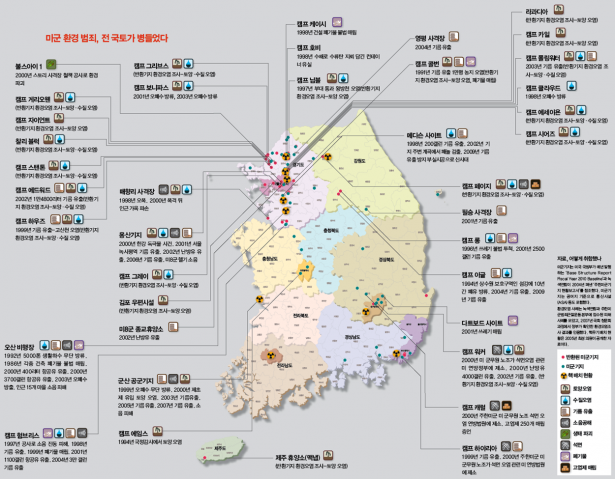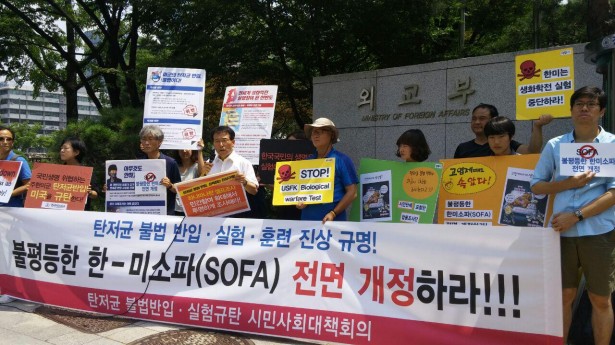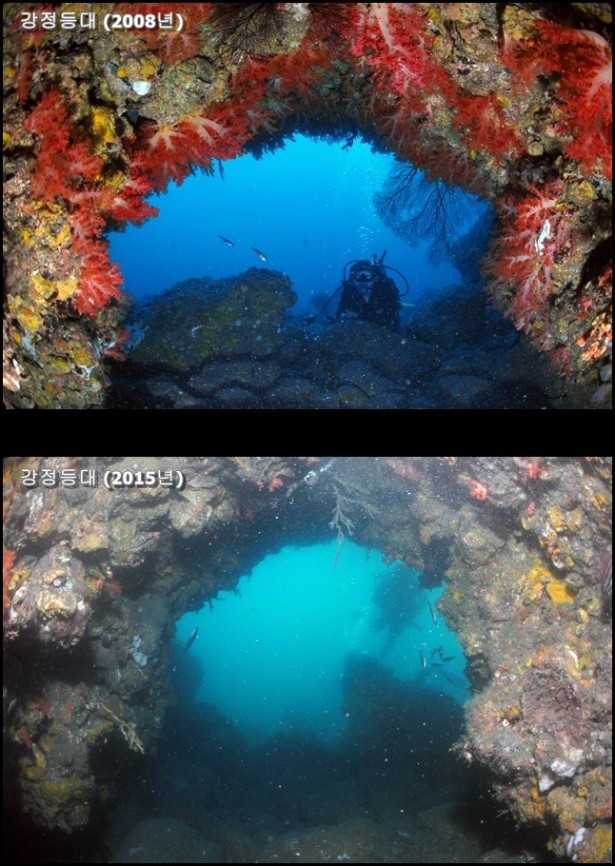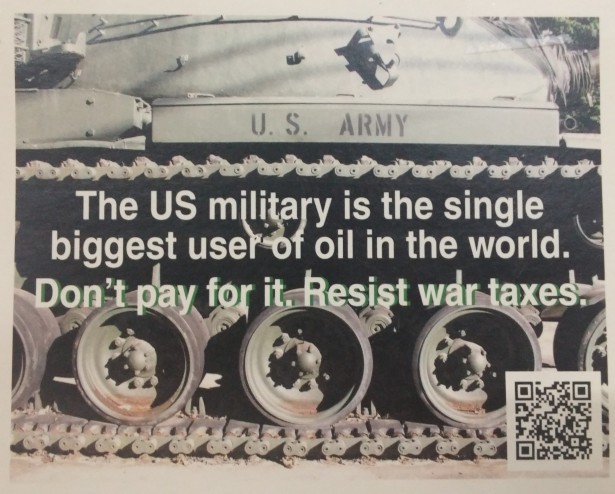군사주의와 환경 정의
지금 한국은 대규모 한미 군사연습(2016.3.7~4.30) 중이다. 미국은 이번 키리졸브 독수리연습(KE/FE)에 핵 항공모함, 핵 잠수함, 전략 폭격기 등 전략 자산을 총 출동시켰다. 한국군 30만 명, 미군 1만 7000명이 동원되어 병력 규모도 사상 최대이다. 이번 연습에 적용되는 군사 전략 역시 공격적이다. 유사시 북한에 대한 선제공격을 공식화하고, 지도부를 타격하며 북한의 주요 도시를 점령하는 작전을 명시하고 있다. 언론에서는 북한의 4차 핵실험과 장거리 로켓 발사에 대한 미국의 강력한 경고라고 해석한다. 하지만 이러한 공격적 군사연습은 남북 관계의 대안이 될 수 없다. 대규모 군사연습이 진행될 때마다 남북한 간 군사적 갈등과 위기가 고조되는 악순환을 겪을 뿐이다. 평화활동가들은“이러다가 전쟁 난다. 전쟁연습 중단하라”는 슬로건으로 미 대사관과 거리에서 1인 시위와 캠페인, 행진을 벌이고 있다.
군사기지로 인한 광범위한 환경문제
이러한 상황 속에 군사 활동으로 인한 환경 문제는 주목해야 할 주제이다. 한국의 시민들은 군사주의로 인한 다양한 형태의 환경 문제로 위협 받고 있다. 군용기의 이착륙과 사격훈련으로 인한 소음, 기름 유출로 인한 토양·지하수오염, 폐수 방류로 인한 수질오염, 실탄 포격으로 인한 중금속 오염, 오격 사고, 또 이로 인한 교육 및 주거환경 훼손 등 그 피해는 심각하고 광범위하다. 한국은 국토 면적이 작고 토지이용률이 높아 대부분의 군사기지는 주거지역과 함께 있거나 거리가 가깝다. 실제로 작년 포천 지역에서는 군 사격연습 중 총탄이 주민 집의 창문과 지붕을 뚫고 들어가는 일이 여러 차례 발생하였다. 또한, 미군기지를 평택, 대구에 집중시키는 과정에서 돌려받은 대부분의 기지는 기름과 중금속에 오염되어 있었다. 반환 받은 미군기지는 공원, 학교, 산업시설 등으로 활용하는데 개발 과정에서 오염된 곳이 더 발견되는 일도 흔하다. 2014년에는 춘천에서 시민들이 미군기지 오염물질에 대한 의혹과 정부의 정화작업에 대한 불신으로 ‘방사능 생활감시단’을 결성하기도 하였다. 춘천의 미군기지 캠프페이지는 2007년 반환 당시 유류 오염이 심각(TPH오염도가 기준치의 100배 이상)했고, 2011년 퇴역 미군이 방사능이 누출된 핵미사일을 춘천시 남쪽에 묻었다는 증언을 한 적이 있다.
군대는 늘 예외
군사기지로 인한 환경오염에 대해 시민들의 우려와 불신이 큰 이유는 정보접근이 제한된 탓이 크다. 군사기지 관련 정보는 국가 기밀로 취급되기 때문에 환경문제라고 하더라도 정보를 얻기 어렵다. 특히나 주한 미군기지의 경우는 더욱 심각하다. 작년에 두 가지 사건이 있었다. 하나는 평택 주한미군기지 내 탄저균 반입 및 실험 사건이다. 치명적인 대량살상무기로 사용되는 탄저균이 반입, 실험, 훈련되었다는 사실이 밝혀진 후, 여러 시민단체 활동가들은 네트워크를 만들어 1주일 만에 8,500명의 시민 동의를 받아 한국과 미국의 책임자들을 고발하였다. 또한 몇 가지 의혹에 대해 조사할 것을 요구하며 1만 5천여명의 서명을 받아 국방부에 전달하고 면담을 요청하였지만 거부당했다. 결국, 주한미군은 평택뿐만 아니라 서울 용산미군기지에서도 탄저균과 페스트균 샘플을 반입하여 실험 및 훈련을 실시한 것이 밝혀졌다. 하지만 한미 정부는 샘플을 안전하게 폐기했으니 문제가 없다는 입장이다. 위험하기 때문에 미국은 사막에서 하는 실험/훈련이, 인구 천 만 이상이 밀집해있는 수도권에서 진행됐지만 책임지는 사람은 아무도 없었다. 또 다른 하나는 정부가 용산미군기지 내부 오염을 조사한 결과에 대해 비공개 처분을 내린 것이다. 환경조사에 대한 객관적 데이터일 뿐인데, 정부는 반환 협상 중이라 외교상의 문제가 생길 것이 염려된다고 했다. 현재 정보공개소송이 진행 중이다.
피해에 대한 비용을 누가 지불하는가?
군사기지 주둔/운용으로 인한 피해는 사람에게만 있는 것이 아니다. 지난 9년간 주민/평화활동가들과 큰 갈등 속에 건설된 제주 해군기지의 경우, 해상 공사하는 바다 주변에 멸종위기 종이자 천연기념물인 연산호 군락이 서식한다. 해군은 천연기념물인 연산호 서식지가 훼손되지 않도록 하라는 조건하에 제구 해군기지 건설을 허가 받았다. 하지만, 몇 년간 주민들과 환경단체의 지속적인 모니터링 결과 연산호 서식지는 눈에 띄게 파괴되었다.
국가 안보, 한미 동맹이라는 명분하에 오늘도 대규모 한미연합 군사연습이 실시되고 있다. 정부와 언론은 긴장과 갈등 관계 속에 군비 경쟁이 정답인 듯 군사주의를 유포한다. 정보 접근이 차단되고 환경 피해에 대한 비용을 사후에야 국민의 세금으로 지불하는 것은 정의로운가? 그리고 과연 돈으로 환경 피해를 복원할 수 있을까.
‘군사주의의 환경비용’에 대해 연구하는 브라이언 파렐(Bryan Farrell)은 전 세계에서 환경에 가장 큰 위해를 주는 것은 미국 군대라고 했다. 전 세계에서 벌어지는 각종 군사활동은 생태계에 독성물질과 방사능을 남긴다. 또한 군의 환경안보 정책에 대한 국내 연구에서도“군사화가 지구온난화와 오존층 파괴에 미치는 영향에 관하여 구체적인 연구가 이루어진 적은 없으나, (과거 자료를 토대로 추정컨대) 커다란 역할을 하고 있음은 틀림없는 사실”(배재진, 환경안보 정책추진에 대한 군의 역할, 2014) 이라고 한다. 국방/군사시설, 활동 차량 등은 공공부문 온실가스 관리 대상에서 제외되어 있고, 이는 국제협상에서도 마찬가지라 관련 데이터를 확인하기는 어렵다. 다만, 군사활동과 전쟁에서 사용되는 석유소비량 등에 대한 국내외 추정 자료를 보면, 군사주의 역시 기후변화를 불러오는 주범이라고 볼 수 있다. 각국 정부가 ‘평화’를 지키겠다며 생태계를 파괴하고 생명을 살상하는 전쟁 연습을 계속 한다면, 각종 군사활동으로 자원을 낭비하고 환경을 파괴한다면, 그리고 우리가 그 모습을 지켜보기만 한다면, 우리에게 ‘환경 정의’도 ‘기후 정의’도 없다. 반전 평화운동과 환경운동이 연대해야 하는 이유이다. 이 모든 질문에 ‘정의’의 문제가 있다.
– 위 글은 80여개 반군사주의 조직들의 국제 네트워크인 전쟁저항자인터내셔널(War Resisters’ International, WRI) 의 ‘군사주의와 환경 문제’를 주제로 한 특집에 기고되었습니다.
-작성 : 신수연 (녹색연합 평화생태팀) / written by Shin Soo Yun (Green Korea United)
Militarism and Environmental Justice
South Korea is presently conducting large-scale joint military drills with the United States (2016.3.7-4.30). The United States have mobilized its total assets such as nuclear aircraft carriers, nuclear submarines and strategic bombers in Operation Key Resolve/Foal Eagle. The military drills involving 300,000 South Korean troops alongside 17,000 United States troops have this year amounted to an all time high. They are strategically aggressive in nature seeking to formulate a preemptive attack on North Korea, striking at its leadership while simulating plans for a direct capture of its capital city. The media view the scale of these exercises as signaling a strong warning from the United States in response to North Korea’s fourth nuclear test and long distance rocket launch. However, these aggressive military exercises cannot be viewed as an alternative to North-South relations. Every time a massive military exercise is conducted it sets in train a vicious cycle that only leads to heightened risk of North-South military conflict and crisis. Peace activists shout slogans such as ‘Stop banging the drumbeats of war. Stop war exercises’ in front of the United States Embassy in Seoul and are also engaged in one person protests and marches to put a halt to the war exercises.
A wide range of environmental problems arise due to the military base.
Environmental problems caused by military activity need to be highlighted in an urgent manner. Korea’s citizens are threatened by environmental problems in manifestly different forms as a result of militarism. Noise pollution caused by constant take offs and landings of warplanes as well as from shooting ranges together with soil and groundwater pollution caused by oil spills, water pollution due to wastewater discharge and heavy metal pollution caused by live ammunition firing as well as numerous other instances of environmental damage in residential areas including the Ohgyeok accident have been extensive and widespread. South Korea’s land mass is small and most of the increase in land utilization for residential use happens to be nearby military installations. In fact, last year there were numerous instances of stray bullets being fired through the windows and roofs of houses of residents in the Pocheon area. In areas where there’s a high concentration of U. S military bases such as Pyeongtaek and Daegu there has been high levels of soil contamination with oil and heavy metals. Around areas of returned U.S military bases, the development of sites for parks, schools and industrial facilities has often led to the discovery of further contamination. In 2014, the citizens of Chuncheon so suspicious and distrustful of government efforts to ensure the cleanup of contaminants in the vicinity of U.S military installations decided to form a radiation monitoring team themselves. At the time of the return of Camp Page in Chuncheon the level of oil contamination was deemed very serious with the level of Total Petroleum Hydrocarbon (TPH) pollution over 100 times the permissible level. In 2011 a retired U.S soldier claimed he witnessed an accident involving a nuclear tipped warhead at Camp Page’s nuclear silo in south Chuncheon which would suggest a nuclear discharge.
Military’s exemption status
The main reason for citizens concerns and distrust when it comes to environmental pollution can be attributed to the lack of access to information. Information in relation to environmental pollution at military installations has been regarded like a state secret and very difficult to obtain, even more so when it comes to United States Forces Korea (USFK) installations. Last year there were two incidents. One concerned the Pyeongtaek USFK military base and the import and testing of anthrax samples. When it came to light that Anthrax (known to be used in the making of weapons of mass destruction) samples were imported, tested and used in training, a number of activists from civil society organized a mass network within a week of 8,500 people calling for the prosecution of those responsible. Furthermore, a signature campaign demanding that various allegations be investigated was signed by 10,500 people and submitted to the Department of Defense but a subsequent request for an interview was denied. Not only did shipments find their way to Pyeongtaek USFK military base, but it has also been revealed that experiments on Anthrax and plague bacteria samples have been conducted at the Yongsan US military base in Seoul as well. However, the South Korea-US government’s position is that it has safely disposed of the samples. Due to the associated high risks, such experiments are normally conducted by the US military in desert areas. It defies belief how such experiments were allowed to be conducted in a highly densely populated city and no one to take responsibility for such actions. Furthermore, the government stated that it will make findings of an investigation into internal pollution at Yongsan military base known in a private disposition. What is at stake is obtaining objective findings/data with regard to the environmental investigation but due to the sensitive nature of negotiations around the return of military bases, the government says it is concerned that public disclosure of its findings would jeopardize the process. A lawsuit is currently being brought against the government demanding full disclosure of its findings.
Who pays for environmental cleanup?
It is not only humans that bear the brunt of the costs of operating military bases. Gangjeong residents and peace activists have been engaged in a nine year long struggle in opposition to the construction of the Jeju Naval base, along a pristine coastline which is home to endangered species and soft coral colonies comprising a ‘natural monument’. The navy received authorization to proceed with the construction work on condition that the soft coral colonies comprising the ‘natural monument’ would be protected from damage. However, the results of ongoing monitoring conducted by residents and environmental groups over the years have shown that soft coral habitats have suffered noticeable damage and deterioration. Under the pretext of national security, the US-ROK alliance today is presently carrying out joint military exercises. Although tensions run very high on the peninsula and the saber rattling continues unabated, the government and mainstream media see promoting militarism and fuelling the arms race as the only solution. Access to information is denied to the public and yet the tax payer gets to foot the bill to pay for environmental damage caused by militarism. Is this just or right? Will money indeed ever restore the environmental damage?
Bryan Farrell, in his research on the ‘environmental costs of militarism’ and has come to the conclusion that the greatest single assault on the environment all around the globe comes from the Armed Forces of the United States. Military activity is laying out acres of depleted uranium and other toxic substances in ecosystems across the world. Also, environmental security policy of the national research institute states that “..although there is no concrete evidence based on concrete research, there is little doubt about the role that militarization plays in being an important factor that contributes to global warming and the destruction of the ozone layer…” (claim based on historical data). Defense/military facilities and vehicles have exempt status from regulations around public-sector greenhouse gas requirements and are exempt from international negotiations about which data is notoriously difficult to obtain. However, when one looks at national and international data estimates of oil consumption by military during war time and outside of wartime there is no doubt that militarism justifies the main culprit status as the main contributor to climate change. The claim made by governments to promote and work for peace on the one hand, while destroying ecosystems and continuing to prepare for endless war on the other, wasting valuable resources in the process of laying waste to the planet is a scandal. If we merely stand by as passive observers we are also complicit in postponing ‘ environmental justice ‘and ‘climate justice.’ The time has come for the peace and environmental movements to work together in solidarity if true ‘justice’ is to be realized.










